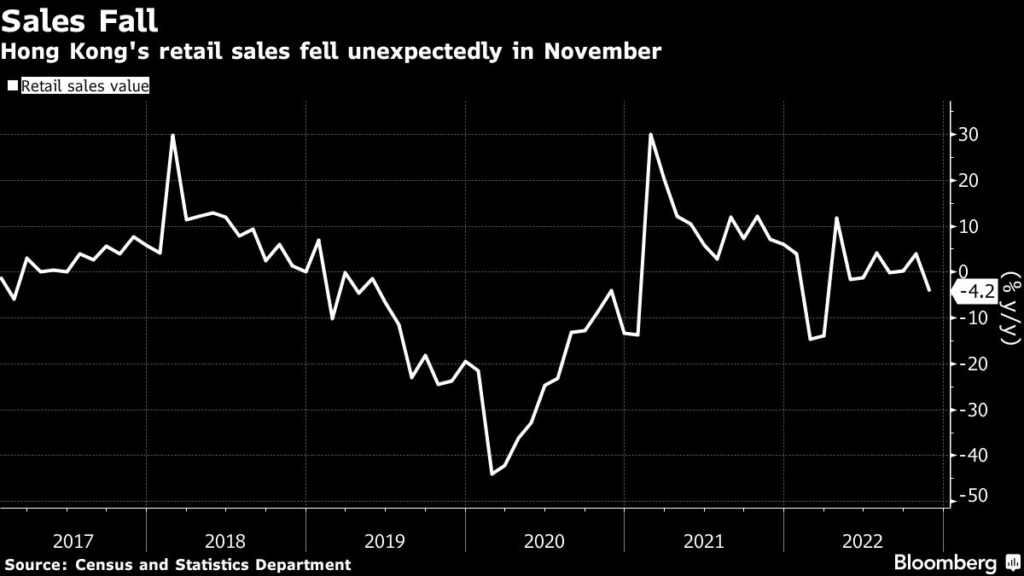Hong Kong’s retail sales unexpectedly dropped in November by the most in eight months as the city struggled to shake off the lingering effects of its pandemic-era controls and a slowing global economy.
(Bloomberg) — Hong Kong’s retail sales unexpectedly dropped in November by the most in eight months as the city struggled to shake off the lingering effects of its pandemic-era controls and a slowing global economy.
Retail sales value fell 4.2% from a year ago, the Census and Statistics Department said Wednesday. That was far worse than the forecast for a 4.8% rise in a survey of economists, and also lower than the 4% increase in October. It was the worst performance since March, when sales plunged 13.8%.
Sales volume decreased 5.3%, compared with economists’ expectations of a 3.3% rise, with a government spokesman saying in a statement that the retail business had “softened” in November.
The drop that month may be due to Hong Kong’s reopening of its international border, according to Samuel Tse, an economist at DBS Bank Ltd.
“Everyone rushed out for outbound travel. That explains why retail sales are really bad,” he said. “Foreigners weren’t traveling to Hong Kong when Covid curbs still remained, while Hong Kong residents were rushing out.”
The retail data covers consumer spending on goods but not on services such as catering, medical care and entertainment. Those services account for over 50% of total consumer spending.
See Details Here: HK Nov. Retail Sales Value -4.2% Y/y; Est 4.8% (Table)
The sector struggled throughout 2022 as the city was hit by a brutal Covid wave that killed thousands and led to more social distancing rules and business closures. That was followed by the slow reversal of travel restrictions, but only at the end of December did Hong Kong eliminate the last of its major Covid rules, including a requirement that inbound travelers take a PCR test.
The city has handed out spending vouchers to support retailers, though the government has said in the past that “tightened financial conditions” would offset the effects of that aid. Global headwinds including rising interest rates and a worldwide dropoff in demand have weighed heavily on the economy.
In Wednesday’s statement, the government spokesman again cited tighter conditions as likely to weigh on local demand, though said that the further relaxation of social distancing measures and an improving labor market will provide some support. The spokesman also said that an expected increase in visitor arrivals should help the sector.
A long-awaited reopening of Hong Kong’s border with mainland China is likely to boost the economy and lift retail sales in the coming months. City leaders have said they intend to start that reopening by the middle of this month.
Before the pandemic, 80% of Hong Kong’s visitors were from mainland China, noted Tse of DBS.
“As long as the border remains close, even if you open to the rest of the world at most you can get 20% of tourism,” he said, adding that January data should see a “sharp jump” with an even more material one after the Lunar New Year holiday period.
Financial Secretary Paul Chan has said he’s optimistic about the city’s prospects and expects the economy to rebound as the border reopens. Economists at Goldman Sachs Group Inc. last month predicted the Asian hub could see an estimated 7.6% boost to gross domestic product as exports and tourism income climb.
(Updates to include economist comments.)
More stories like this are available on bloomberg.com
©2023 Bloomberg L.P.










